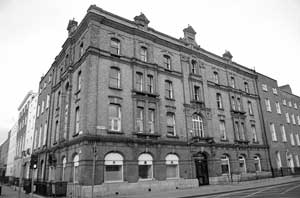By Joseph E.A. Connell Jr
Éamon de Valera issued his famous ‘Legion of the Rearguard’ statement to anti-Treaty fighters on 24 May 1923:

‘Soldiers of the Republic. Legion of the Rearguard: The Republic can no longer be defended successfully by your arms. Further sacrifice of life would now be in vain and the continuance of the struggle in arms unwise in the national interest and prejudicial to the future of our cause. Military victory must be allowed to rest for the moment with those who have destroyed the Republic.’
Despite de Valera’s statement, the Civil War did not come to a declared truce, nor to an official surrender of the anti-Treaty forces. The High Court ruled on 31 July 1923 that a state of war no longer existed, and consequently the internment of republicans, permitted under common law only in wartime, was now illegal. Without a formal peace, holding 13,000 prisoners and worried that fighting could break out again at any time, the government enacted two Public Safety (Emergency Powers) Acts on 1 and 3 August 1923, to permit continued internment and other measures, including the suspension of habeas corpus. The provisions of that Act included:
‘AN ACT TO PROVIDE FOR THE PRESERVATION OF PUBLIC SAFETY AND THE PROTECTION OF PERSON AND PROPERTY AND FOR MATTERS CONNECTED THEREWITH OR ARISING OUT OF THE PRESENT EMERGENCY [1 August, 1923].
WHEREAS a number of persons have been for some time past engaged in an attempt to overthrow by force the lawfully established Government of Saorstát Éireann and to that end have created a state of rebellion which has been carried on by means of armed attacks on the Military Forces of Saorstát Eireann … AND WHEREAS it is desirable that the Civil Authorities should be endowed with such powers as will enable them lawfully to co-operate with the Military Forces in the work of restoring and maintaining order and to re-establish the supremacy of law and Civil Government …
BE IT THEREFORE ENACTED BY THE OIREACHTAS OF SAORSTÁT EIREANN AS FOLLOWS:— [inter alia]
3.—(1) Every person who is now detained in military custody or held as a military prisoner or captive … may be detained in custody under this Act
(a) by the military authorities if those authorities are of opinion that his detention is a matter of military necessity … or
(b) under an order of an Executive Minister if such Minister is of opinion that the public safety would be endangered by such person being set at liberty.
(2) Every person who at the date of the passing of this Act is serving a sentence of imprisonment or penal servitude imposed on him by a tribunal established by the military authorities shall, whether he is or is not a person ordinarily subject to military law, continue to serve such sentence so long as it is unexpired or undischarged.’
That Act was only to continue in force for six months. Subsequently, in January 1924, the government had to reauthorise provisions of the Act, to remain in effect until January 1925.
Joseph E.A. Connell Jr is the author of The Terror War: the uncomfortable truths of the Irish War of Independence (Eastwood Books, 2022).
